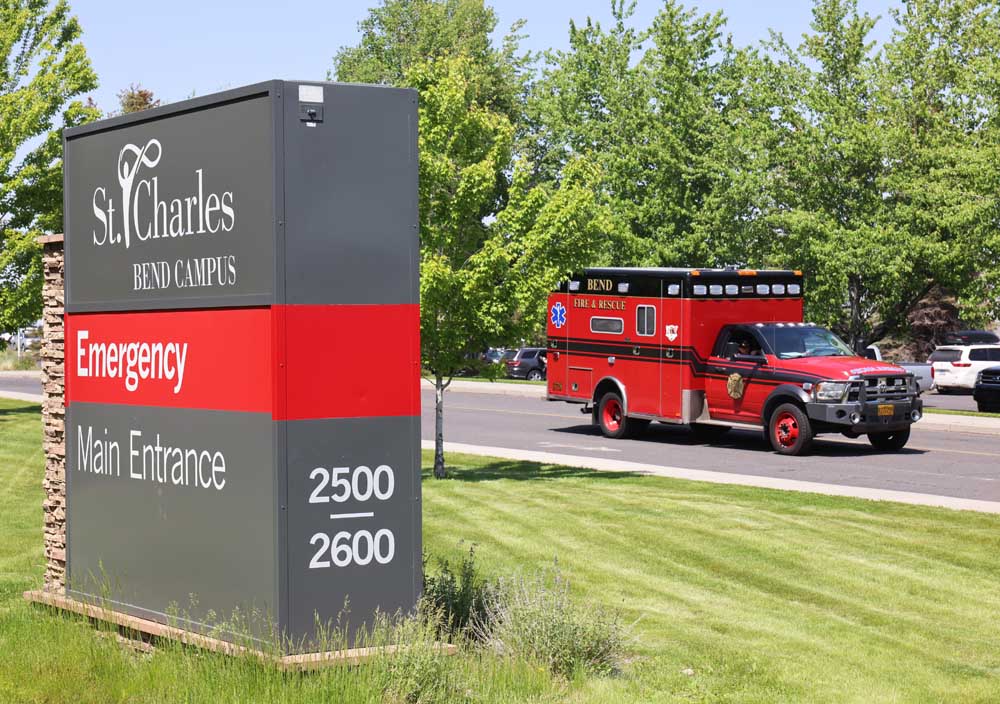Editorial: Insurers should look at themselves if St. Charles dumps Medicare Advantage
Published 11:00 am Wednesday, August 16, 2023

- The main entrance of St. Charles Bend campus.
Insurers can sculpt much of what happens in health care. A scene from St. Charles shows how.
A woman in her 80s came into one of the hospital system’s emergency departments this month. Her high blood pressure was out of control. Her heart rate was high. Her heart rhythm was abnormal. And her mental status made it difficult to treat her. She had to be physically restrained at one point, Dr. Mark Hallet, chief clinical officer at St. Charles told us.
She was admitted. The staff at St. Charles stabilized her blood pressure, her heart. Her mental status remained tricky. The staff at St. Charles looked for options where she could get the additional care she may need, perhaps at a memory care center.
After four days, her mental status became more normal. She could manage her medicines. She was able to be discharged home with her daughter.
There’s nothing about that part of her care that sticks out. But her Medicare Advantage insurer denied her inpatient admission. The company said it would treat it as outpatient care, Hallet told us. The insurer basically switched the billing in a way to give the patient high copays and deductibles. Doctors and staff at St. Charles now have to go and argue with the Medicare Advantage insurer why it is not best for the patient to retrospectively deny a four-day admission.
That example is one of the reasons why St. Charles may drop participation in all Medicare Advantage plans. It’s a type of Medicare insurance that can be a good deal for people in coverage and cost. It can also be a bad deal for patients and providers.
Staff at the hospital believe it is not the best way to care for patients. It can put patients in a financial vise. Medicare Advantage can mean it takes longer for the hospital to get authorization for care. It can mean patients stay longer at the hospital than is appropriate, because they can’t be discharged to a place that would be a better option. Those issues don’t just come up at St. Charles. It happens across the country.
“Whatever the financial component of this is, we are talking about elevating the concerns of patient safety and quality of care as well as caregiver burden to the same level of concern that insurance companies have” with their interests, Matt Swafford, chief financial officer at St. Charles told us. “Folks love to have the benefits under Medicare Advantage. But when they need to use the acute care system under those plans, it doesn’t necessarily work to their advantage.”
Some say the advantage part of Medicare Advantage is to insurers. Insurers love it. It is paid for by the federal government. Private insurers run it. And it is very profitable. The Kaiser Family Foundation estimates that the gross margins in Medicare Advantage insurance may be double what they are in other types of health care insurance.
Volleys at health insurers are routine in the world of health care reform. Some see insurers as specters to be tamed or slain. Oregon legislators have backed a plan aiming to have the state become the single payer for health care, shuttling off insurers to small corners of the health insurance market. Medicare Advantage also has been on the wishlist for changes by the Biden administration.
We would rather see consumers have the choice of Medicare Advantage. We worry consumers may struggle with any change. It also seems wrong that a hospital system can effectively banish a legal type of health insurance coverage. But Dr. Steve Gordon, the CEO of St. Charles, is right. Medicare Advantage’s potential has been sunk by miserable realities. It’s interrupting care for patients and challenging their finances. It is creating more work for St. Charles when it is already facing a growing population, an aging population and challenges finding staff. If St. Charles ejects coverage for Medicare Advantage, insurers will need to be looking at themselves.






